湖北仙桃一中2019-2020学年高二年级下学期期中考试英语试卷答案
2019-2020年高二下学期期中检测英语含答案

2019-2020年高二下学期期中检测英语含答案第一部分听力(共两节, 共20小题,每小题1.5分,满分30分)第一节:(共5小题, 每小题1.5分, 满分 7.5分)请听下面5段对话,选出最佳选项。
1. What size does the woman want?A. Size 8.B. Size 10.C. Size 12.2. How does the man feel about his job?A. He enjoys it.B. He doesn’t like it at all.C. He wants to find a new job.3. When will the woman have dinner?A. At 6:00 pm.B. At 7:00pm.C. At 8:00pm.4. Where does the conversation most probably take place?A. In a bookstore.B. In a museum.C. In a shopping mall.5. What is the woman going to do?A. To buy a silk dress.B. To attend a party.C. To wear a new dress.第二节(共15小题; 每小题1.5分,满分22.5分)听下一段材料,回答第6至8题。
6. What does the man want to do?A. To buy some medicine.B. To buy some books.C. To post a letter.7. What does the woman ask the man to do?A. To lend her a bike.B. To get some books.C. To buy some medicine.8. What is the matter with the woman?A. She has got a cold.B. She can’t sleep well.C. She hurts herself.听下一段材料,回答第9至10题。
湖北省仙桃一中2020年高二年级下学期期中考试英语试题(含解析)
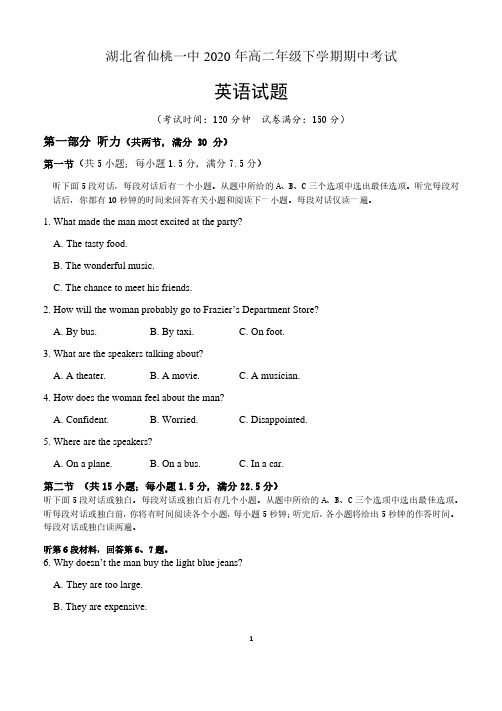
湖北省仙桃一中2020年高二年级下学期期中考试英语试题(考试时间:120分钟试卷满分:150分)第一部分听力(共两节,满分 30 分)第一节(共5小题;每小题1.5分,满分7.5分)听下面5段对话,每段对话后有一个小题。
从题中所给的A、B、C三个选项中选出最佳选项。
听完每段对话后,你都有10秒钟的时间来回答有关小题和阅读下一小题。
每段对话仅读一遍。
1.What made the man most excited at the party?A.The tasty food.B. The wonderful music.C. The chance to meet his friends.2. How will the woman probably go to Frazier’s Department Store?A. By bus.B. By taxi.C. On foot.3. What are the speakers talking about?A. A theater.B. A movie.C. A musician.4. How does the woman feel about the man?A. Confident.B. Worried.C. Disappointed.5. Where are the speakers?A. On a plane.B. On a bus.C. In a car.第二节(共15小题;每小题1.5分,满分22.5分)听下面5段对话或独白。
每段对话或独白后有几个小题。
从题中所给的A、B、C三个选项中选出最佳选项。
听每段对话或独白前,你将有时间阅读各个小题,每小题5秒钟;听完后,各小题将给出5秒钟的作答时间。
每段对话或独白读两遍。
听第6段材料,回答第6、7题。
6. Why doesn’t the man buy the light blue jeans?A.They are too large.B.They are expensive.1C.They don’t match his T-shirt.7.How much will the man pay?A.$39.B. $59.C. $ 69.听第7段材料,回答第8、9题。
2019-2020学年湖北仙桃一中高二年级下学期期中考试英语试题
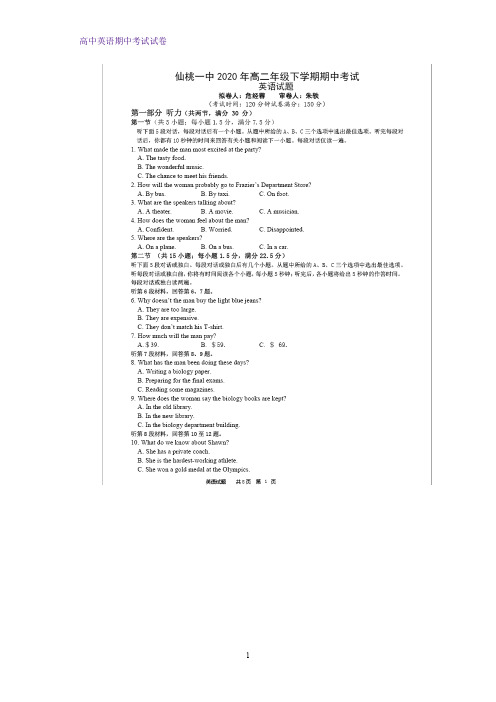
——★参考答案★——一、听力1-5 CCBBA 6-10 BACAC 11-15 BAACB 16-20 AABCB二、阅读理解21-25 BABCD 26-30 AADDC 31-35 CBBDA 36-40 CGBFE三、完形填空41-45 BACAD 46-50 DCBAC 51-55 CADDB 56-60 BBDCB四、语法填词61. to remember 62.will burn 63. these/the 64. that 65. most important 66. is held67. when 68. which 69. happiness 70. because五、短文改错71. were→was 72. live前∧to 73. popularly→popular 74. 去掉entered后的in75. which→that 76. them→it 77. climb→climbing 78. picture→pictures79. amazed→amazing 80. How→What六、书面表达Garbage classification, whether you are accustomed to it or not, is making a change to the way we live. Taking our community as an example, dustbins in different colors have been put into use and most residents are clear about the rules of classification and willing to follow the instructions.Even though it takes a little more time for individuals to sort out their own garbage, it saves the government a considerable amount of time and allows more things to be recycled. In this way, we are shouldering our share of responsibility as citizens. It pays to put garbage into different categories, for our own sake and the sake of nature.。
湖北省2019-2020学年高二下学期期中考试英语试卷含答案
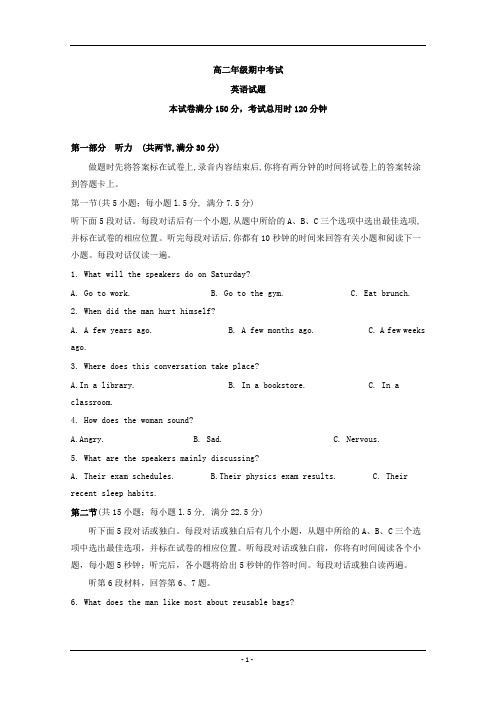
高二年级期中考试英语试题本试卷满分150分,考试总用时120分钟第一部分听力 (共两节,满分30分)做题时先将答案标在试卷上,录音内容结束后,你将有两分钟的时间将试卷上的答案转涂到答题卡上。
第一节(共5小题;每小题l.5分, 满分7.5分)听下面5段对话。
每段对话后有一个小题,从题中所给的A、B、C三个选项中选出最佳选项,并标在试卷的相应位置。
听完每段对话后,你都有10秒钟的时间来回答有关小题和阅读下一小题。
每段对话仅读一遍。
1. What will the speakers do on Saturday?A. Go to work.B. Go to the gym.C. Eat brunch.2. When did the man hurt himself?A. A few years ago.B. A few months ago.C. A few weeks ago.3. Where does this conversation take place?A.In a library.B. In a bookstore.C. In a classroom.4. How does the woman sound?A.Angry.B. Sad.C. Nervous.5. What are the speakers mainly discussing?A. Their exam schedules.B.Their physics exam results.C. Their recent sleep habits.第二节(共15小题;每小题l.5分, 满分22.5分)听下面5段对话或独白。
每段对话或独白后有几个小题,从题中所给的A、B、C三个选项中选出最佳选项,并标在试卷的相应位置。
听每段对话或独白前,你将有时间阅读各个小题,每小题5秒钟;听完后,各小题将给出5秒钟的作答时间。
每段对话或独白读两遍。
听第6段材料,回答第6、7题。
2019-2020年高二下学期期中考试英语试卷 含答案
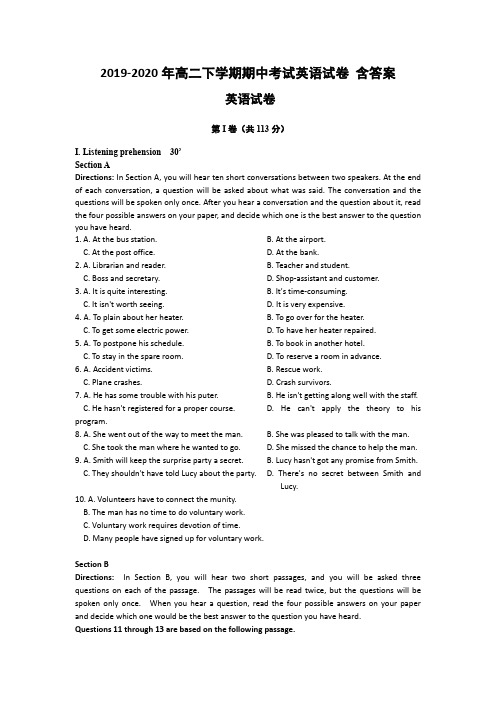
2019-2020年高二下学期期中考试英语试卷含答案英语试卷第I卷(共113分)I. Listening prehension 30’Section ADirections: In Section A, you will hear ten short conversations between two speakers. At the end of each conversation, a question will be asked about what was said. The conversation and the questions will be spoken only once. After you hear a conversation and the question about it, read the four possible answers on your paper, and decide which one is the best answer to the question you have heard.1. A. At the bus station. B. At the airport.C. At the post office.D. At the bank.2. A. Librarian and reader. B. Teacher and student.C. Boss and secretary.D. Shop-assistant and customer.3. A. It is quite interesting. B. It's time-consuming.C. It isn't worth seeing.D. It is very expensive.4. A. To plain about her heater. B. To go over for the heater.C. To get some electric power.D. To have her heater repaired.5. A. To postpone his schedule. B. To book in another hotel.C. To stay in the spare room.D. To reserve a room in advance.6. A. Accident victims. B. Rescue work.C. Plane crashes.D. Crash survivors.7. A. He has some trouble with his puter. B. He isn't getting along well with the staff.C. He hasn't registered for a proper course.D. He can't apply the theory to his program.8. A. She went out of the way to meet the man. B. She was pleased to talk with the man.C. She took the man where he wanted to go.D. She missed the chance to help the man.9. A. Smith will keep the surprise party a secret. B. Lucy hasn't got any promise from Smith.C. They shouldn't have told Lucy about the party.D. There's no secret between Smith andLucy.10. A. Volunteers have to connect the munity.B. The man has no time to do voluntary work.C. Voluntary work requires devotion of time.D. Many people have signed up for voluntary work.Section BDirections:In Section B, you will hear two short passages, and you will be asked three questions on each of the passage. The passages will be read twice, but the questions will be spoken only once. When you hear a question, read the four possible answers on your paper and decide which one would be the best answer to the question you have heard.Questions 11 through 13 are based on the following passage.11. A. Nick lost the book Ivan borrowed from the library.B. The book Ivan borrowed from Nick was missing.C. Nick and Ivan had conflicts in Ms. Salmon's class.D. Ivan was asked to return the book before finishing it.12. A. She asked Nick and Ivan to solve the problem by themselves.B. She gave Nick and Ivan the solution to their problem immediately.C. She asked students in social studies class to help solve the problem.D. She persuaded Ivan to pay for the book that Nick lent to him.13. A. A good way to resolve conflicts is to turn to your best friends.B. Nick and Ivan were unsatisfied with the solution to their problem.C. Signing an agreement helped to solve Nick and Ivan's problem.D. Social studies class can equip students with skills to resolve conflicts.Questions 14 through 16 are based on the following news.14. A. She wanted to have a garden similar to their neighbor's.B. Her husband would like to have a beautiful backyard.C. She was going to make the rented house her own home.D. The munity required them to keep the backyard lovely.15. A. By getting involved in doing voluntary work.B. By picking up mails for their neighbors.C. By keeping an eye on their neighbors' children.D. By planting trees along the street with others.16. A. Her husband volunteered to work in the neighborhood.B. They took on new responsibilities for their neighbors.C. She was planning to plant a new garden in the backyard.D. She enjoyed the relationship they built with the munity.Section CDirections:In Section C, you will hear two longer conversations. The conversations will be read twice. After you hear each conversation, you are required to fill in the numbered blanks with the information you have heard. Write your answers on your answer sheet.plete the form. Write ONE WORD for each answer.Blanks 21 through 24 are based on the following conversation.II. Grammar and VocabularySection A 17’Directions: After reading the passages below, fill in the blanks to make the passages coherent and grammatically correct. For the blanks with a given word, fill in each blank with the proper form of the given word; for the other blanks, use one word that best fits each blank.( A )Health Is a Laughing MatterIf you think back to an occasion when something made you laugh out loud, you’ll probably find your lips starting to twitch (抽动) again and that same positive feeling invading your body.25 you may not realize, though, is that this good for you. Both smiling and laughing have a beneficial effect on your health. Laughter, the physical sign which indicates you are enjoying your life, is one of 26 (cheap) beauty treatments. It reduces stress, nourishes the spirit and is a natural antidepressant.Laughing produces a chemical effect in the body. 27 makes the body produce biochemical substances such as serotonin (止清素) and adrenaline (肾上腺素). These boost the immune system (免疫系统), activating the cells and stimulating their division.There is also a physical effect. A full-blown laugh-out-loud session mobilizes and strengthens over 400 muscles; it gets the heart and abdomen (腹部) working. Laughing out loud also aids digestion, reduces fatty acids, decreases pain and benefits breathing. When you laugh, your blood bees 28 (charge) with electomagentic (电磁的) energy, 29 can improve circulation.Laughing 30 you cry, in addition, could improve your ability 31 (see) clearly and make you see colors more vividly. But a good laugh clears not just the eyes but the ears and nose, too.Actually, the health benefits of laughter 32 (recognize). There is even a World Laughter Organization, based in Spain. Mari Cruz Garcia, the president and a laughter therapy expert, says, “Laughter develops imagination and creativity, reduces anxiety, and produces a facial massage (按摩). Five minutes of laughter acts as a pain reliever; laughing 100 times is equivalent to 33 (do) ten minutes of aerobic exercise, and 20 seconds of laughter is equivalent to a three-minute workout at the gym!”( B )It’s another Oscar season. This year, Leonardo Dicaprio, Brie Larson and many other lucky winners accepted their Oscars and thanked the Academy of Motion Picture Arts (美国电影艺术与科学学会), their families and colleagues. So, 34 linguistic(语言的) terms, what makes an acceptance speech succeed where others fail?To explore this, let’s take a look at a few thank-yous from the best actresses, some from the mid-twentieth century and some from recent years.The first is English actress Vivien Leigh (费雯丽), 35 (receive) the Academy Award for Gone with the Wind in 1940. “Ladies and gentlemen,”she said, “please forgive me if my words are inadequate in thanking you for your very great kindness. If I were to mention all those who have shown me such wonderful generosity, I should have to entertain you with a speech as long as Gone with the Wind itself.”Leigh begins with a humble apology 36 (emphasize) the depth of her appreciation. It’s 37 words-fail-me approach.British- American actress Olivia de Havillland received her first Oscar in 1947, going on a bit to explain her pride in the award. “Since I value highly the profession which 38 (instruct) me, rewarded me and permitted my share of the world’s work, it will understand and forgive me, I know, for the very great pride I feel in receiving this award,” she said.In the 21st century, the language has changed, but we find the same strategies:pride, humor and some references to childhood. Kate Winslet, for example, 39 (mention) her youthful dreams 40 receiving her Academy Award for The Reader(《生死朗读》)in xx. “I’d be lying if I haven’t made a version of this speech before. I think I was probably eight years old and staring into the bathroom mirror and this would have been a shampoo bottle. Well, it’s not a shampoo bottle now!” she said in a humorous tone.These are just a sample. If we were to look at the full range of acceptance speeches, who knows what we 41 find. After all, in order not to make for a pretty boring ceremony, successful acceptance speeches are often indirect and they often go beyond a simple “thank you.”Section B 10’Directions: plete the following passage by using the words in the box. Each word can only beWhether you have 5,000 friends on Facebook or 50, chances are at least some of them are not really your friends. The majority of them cannot develop a 42 friendship with you.And it doesn’t 43 , of course, some of your friends are robots. According toa newly published University of Oxford study, the average Facebook user may have just four“close” friends to depend on in times of crisis. The number was found to be almost 44 across all age groups, in both men and women, 45 of how many friends they could boast online.To carry out the study, Oxford psychology professor Robin Dunbar 46 two large, separate groups of adults across the U.K. The first group had 2,000 men and women between ages 18 and 65 who “made regular use of social media,” while the second included1,375 “adults who worked full time” and were not necessarily social media users.Both groups were asked a series of questions about their online and offline behavior, as well as the size of their social networks in both spaces. When asked how many 47 friends they had on Facebook, they offered an average answer of 41.4. When asked, however, how many Facebook friends they could depend on during an emotional or social crisis, those people said the number was 4.1. Around 13.6, they 48 , would express sympathy.“So, in the end, all we have is time,” said Professor Dunbar. “Your brain can only take so much friendship. Your emotions can only be 49 with a few people. Facebook is, indeed, a time-sink(耗费时间的东西), not a glorious new syncing (同步)of souls.”But Dunbar did offer a solution as to how to 50 true friendships.“Friendships, in particular, have a natural decay rate in the absence of contact, and social media may well function to slow down the rate. However, that alone may not be enough to prevent friendships from eventually dying if they are not occasionally 51 by face-to-face interaction,” he said.So, maybe we ought to make more calls and pay more visits to the people we love----there aren’t that many, after all.III. Reading prehensionSection A 15’Directions: For each blank in the following passage there are four words or phrases marked A, B, C and D. Fill in each blank with the word or phrase that best fits the context.Napping for a while at daytime is a very smart and healthy move. The Mayo Clinic says naps 52 relaxation, better mood and alertness, and a sharper working 53 . A xx British study found that pared to getting more nighttime sleep, a mid-day nap was the best way to 54 the mid-afternoon sleepiness.According to the Harvard Health Letter, several studies have shown that people 55new information better when they take a nap shortly after learning it. And, most 56 , a xx study of nearly 24,000 Greek adults in the Archives of Internal Medicine found that people who napped 57 had a 37 percent reduced risk of dying from heart disease pared to people who didn’t nap.Of course, napping isn’t58 for everyone. If you’re suffering from inability to sleep, naps that are too long or taken too late in the day can 59 with your ability to fall or stay asleep at night.But for most, naps can make you feel sharper and happier. Naps provide different benefits 60 on how long they are. A 20-minute nap will boost alertness and concentration; a 90-minute snooze (小睡) can 61 creativity.According to prevention., you 62 a natural dip in body temperature between 1 p.m. and 3 p.m. A short nap at this time can boost alertness for several hours and, for most people, shouldn’t 63 being able to fall asleep at night.Pic k a dark, cozy place that’s not too warm or too chilly. Prevention.64 napping on thecouch instead of in bed, so you’re less65 to snooze for too long.Surprisingly, the best place to take a nap may be a hammock (吊床) if you have one. A Swiss study 66 last year found that people fell asleep faster and had deeper sleep when they napped in a hammock than in a bed. That same rocking motion that puts babies to sleep works wonders for grown-ups, too.52. A. relieve B. promote C. operate D. support53. A. feeling B. frame C. sense D. mind54. A. cope with B. put aside C. talk about D. carry upon55. A. remark B. consider C. remember D. concern56. A. reportedly B. unbelievably C. constantly D. frankly57. A. regularly B. enormously C. heavily D. strongly58. A. exact B. correct C. right D. accurate59. A. connect B. deal C. pete D. interfere60. A. focusing B. depending C. relying D. basing61. A. enlarge B. engage C. enhance D. enroll62. A. explore B. experience C. exercise D. implement63. A. produce B. handle C. affect D. urge64. A. postpones B. discourages C. acknowledges D. remends65. A. obliged B. tempted C. adopted D. attracted66. A. pronounced B. published C. discovered D. cultivatedSection B 33’Directions: Read the following three passages. Each passage is followed by several questions or unfinished statements. For each of them there are four choices marked A, B, C and D. Choose the one that fits best according to the information given in the passage you have just read.(A)Poet William Stafford once said that we are defined more by the detours(绕行路) in life than by the narrow road toward goals. I like this image. But it was quite by accident that I discovered the deep meaning of his words.For years we made the long drive from our home in Seattle to my parents' home in Boise in nine hours. We traveled the way most people do: the fastest, shortest, easiest road, especially when I was alone with four noisy, restless kids who hate confinement(限制) and have strong opinions about everything.Road trips felt risky,so I would drive fast, stopping only when I had to. We would stick to the freeways and arrive tired.But then Banner, our lamb was born. He was rejected by his mama days before our planned trip to Boise. I had two choices: leave Banner with my husband, or take him with me. My husband made the decision for me.That is how I found myself on the road with four kids, a baby lamb and nothing but my everlasting optimism to see me through. We took the country roads out of necessity. We had to stop every hour, let Banner shake out his legs and feed him. The kids chased him and one another. They'd get back in the car breathless and energized, smelling fresh from the cold air.We explored side roads, catching grasshoppers in waist-high grass. Even if we simply looked out of the car windows at baby pigs following their mother, or fish leaping out of the water, it was better than the best ride down the freeway. Here was life. And new horizons.We eventually arrived at my parents' doorstep astonishingly fresh and full of stories.I grew brave with the trip back home and creative with my disciplining technique. On an empty section of road, everyone started quarreling. I stopped the car, ordered all kids out and told them to meet me up ahead. I parked my car half a mile away and read my book in sweet silence.Some road trips are by necessity fast and straight. But that trip with Banner opened our eyes to a world available to anyone adventurous enough to wander around and made me realize thata detour may uncover the best part of journey—and the best part of yourself.67.The author stopped regularly on the country roads to ________.A. relax in the fresh airB. take a deep breathC. take care of the lambD. let the kids play with Banner68. What does the author discover from the trip according to Paragraph 6?A. Freeways are where beauty hides.B. Getting close to nature adds to the joy of life.C. Enjoying the beauty of nature benefits one's health.D. One should follow side roads to watch wild animals.69. What could be the best title for the passage?A. Charm of the DetourB. The Road to BraveryC. Creativity out of NecessityD. Road Trip and Country Life(B)Jacqueline Bouvier Kennedy Onassis was one of the most private women in the world, yet when she went to work as an editor in the last two decades of her life, she revealed herself as she did nowhere else.After the death of her second husband, Greek shipping magnate Aristotle Onassis, Jacqueline's close friend and former White House social secretary Letitia Baldrige made a suggestion that she consider a career in publishing. After consideration, Jacqueline accepted it. Perhaps she hoped to find there some ideas about how to live her own life. She became not less but more interested in reading. For the last 20 years of her life, Jacqueline worked as a publisher's editor, first at Viking, then at Doubleday, pursuing a late life career longer than her two marriages bined. During her time in publishing, she was responsible for managing and editing more than 100 successfully marketed books. Among the first books were In the Russian Style and Inventive Paris Clothes. She also succeeded in persuading TV hosts Bill Moyers and Joseph Campbell to transform their popular television conversations into a book, The Power of Myth. The book went on to bee an international best seller. She dealt, too, with Michael Jackson as he prepared his autobiography (自传),Moonwalk.Jacqueline may have been hired for her name and for her social relations, but she soon proved her worth. Her choices, suggestions and widespread social relations were of benefit both to the publishing firms and to Jacqueline herself. In the books she selected for publication, she built on a lifetime of spending time by herself as a reader and left a record of the growth of her mind. Her books are the autobiography she never wrote.Her role as First Lady, in the end, was overshadowed by her performance as an editor. However, few knew that she had achieved so much.70. We can learn from the passage that Jacqueline ________.A. became fond of reading after working as an editorB. was in charge of publishing 100 booksC. promoted her books through social relationsD. gained a lot from her career as an editor71. The underlined sentence in the last paragraph probably means that ________.A. Jacqueline ended up as an editor rather than as First LadyB. Jacqueline's life as First Lady was more colorful than as an editorC. Jacqueline was more successful as an editor than as First LadyD. Jacqueline's role as First Lady was more brilliant than as an editor72. What can be inferred from the passage?A. Jacqueline's two marriages lasted more than 20 years.B. Jacqueline's own publishing firm was set up eventually.C. Jacqueline's views and beliefs were reflected in the books she edited.D. Jacqueline's achievements were widely known.73. The passage is mainly ________.A. an introduction of Jacqueline's life both as First Lady and as an editorB. a brief description of Jacqueline's lifelong experiencesC. a brief account of Jacqueline's career as an editor in her last 20 yearsD. an analysis of Jacqueline's social relations in publishing(C)As rules, laws are people’s rights and responsibilities toward society. Laws are agreed on by society and made official by governments.Some persons look on laws w ith fear, hatred, or annoyance. Laws seem to limit people’s freedom to do many things they would like to do. Though laws may prevent us from doing things we wish to do at the moment, laws make everyone’s life safer and more pleasant. Without laws we could not hold on to our property; we could not go to bed at night expecting to wake up in the morning and find that we had not been robbed; no stores in which we buy food, clothes, and other necessities could stay open and sell to us. Our banks would not be safe places to keep our money.Social life would be impossible without laws to control the way people treat one another. It is not the laws that should be feared but the trouble that es to everyone when laws are broken. Once this is understood, a citizen will not fear or hate the law. Understanding the need for good laws and the evil results of breaking laws is the first requirement of good citizenship and government.Philosophers once believed that in prehistoric time people lived without laws in a “state of nature”. People were free to do as they pleased unless someone stronger stopped them by force. As a result, life became so dangerous and unsafe that leaders had to create laws to protect life and property.This is no longer believed to be true. Scholars now think that as soon as people began living in small groups, they worked out rules for getting along with one other. In time everyone accepted and supported the rules. Manners, customs and beliefs controlled the living habits and behavior of the group. Such rules and habits of life are called folkways.Folkways are probably the real meaning of human laws, as well as of religion, morals, and education. As life became more plex, folkways became more plete guides to living. After thousands of years, some of the important folkways were put into writing as the earlier laws. Andas life grew more and more plicated with faster transportation and the rise of modern industry and big cities, more human acts and interests had to be ruled by law. This led to a great increase in the number of laws.But we know that unless laws are enforced, they cannot protect us. Poorly enforced laws invite crime and violence. So we agree that the best protection against crime is planned social change and law reform -- to reduce the causes of crime and to encourage people to obey the laws. Such a solution would join a sound system of law enforcement with forces working to prevent crime. To attain this goal, all citizens must understand the need for good laws and for their enforcement.74. Some persons look on laws with fear, hatred, or annoyance, because_____.A. laws and rules are too plicated to understandB. they can’t do whatever they want toC. laws only protect those who worked out themD. they feel it unnecessary to have laws75. Which of the following statement is NOT TRUE?A.Without laws we may fail to hold on to our propertyB.Good citizens and government should be aware of the need for good laws and the evilresults of breaking lawsC. In prehistoric time people lived happily without laws in a “state of nature”.D. Human laws, as well as of religion, morals, and education, are believed to originate fromFolkways.76. A sound system of law enforcement is necessary because_____.A. some citizens fear or hate the law.B. the evil results of breaking laws are getting fewer and fewer .C. we need someone stronger to stop crime by force.D. poorly enforced laws cause crime and violence.77. What’s the best title of this passage?A. The Origin of LawsB. Enforcement of LawsC. Leaders and LawsD. Laws and rules.Section C 8’Directions: Read the passage carefully. Then answer the questions or plete the statements in the fewest possible words.Dog owners often talk about their pets like they’re part of the family. In fact, it often seems as though owners see their dogs as their kids. Now, scientists have found that the connection between humans and their dogs is similar to the mother-child bond, and it’s strengthened by the same thing: a loving gaze.The study was led by Takefumi Kikusi, an animal behaviorist at Azabu University (麻布大学) in Japan. When our dogs gaze into our eyes with that “you are everything to me” look, our bodies----and theirs as well----are flooded with oxytocin (催产素),the hormone of love and care that strengthens the bond between people.Additionally, the more dog owners and their canine (犬科的) panions gazed into each other’s eyes, the more oxytocin both sides produced, Japanese researchers discovered. And themore we humans return a pet’s gaze, the more definitely we believe ours is the best dog in the whole wide world. That’s why service dogs, which are bred and trained to develop particularly powerful bonds with their owners, are proving their worth with patients.These findings, published in the journal Science, were based on 30 pairs of dog owners and their beloved pets. For the sake of parison, the researchers also analyzed the interactions between 11 wolves and the animal management professionals who had raised, fed and played with them, but they saw neither mutual (互相的) gaze nor the oxytocin increase.As the researchers put it, the experiments prove that “humans may feel affection for their panion dogs similar to that toward human family members.” They also help solve the myster y how species from very different branches of the evolutionary tree came to live together in such close harmony . The effect of eye contact between owners and their dogs is more meaningful than we thought. When your dog is gazing at you, she may not just be after your sandwich.78. In which way do the relationships between dogs and owners and the mother-child bond resemble?79. What does “that” refer to in the second line of the last paragraph?80. What is the general idea of the whole passage?81. Acco rding to the Takefumi Kikusi’s study, they saw both_____________ and ____________ between dogs and their owners when they are looking at each other.第II卷(共37分)I. Translation22’Directions: Translate the following sentences into English, using the words given in the brackets.1. 那个刚从瑞典来的年轻人接管了这儿所有的工作。
答案 仙桃一中2020年高二年级下学期期中考试
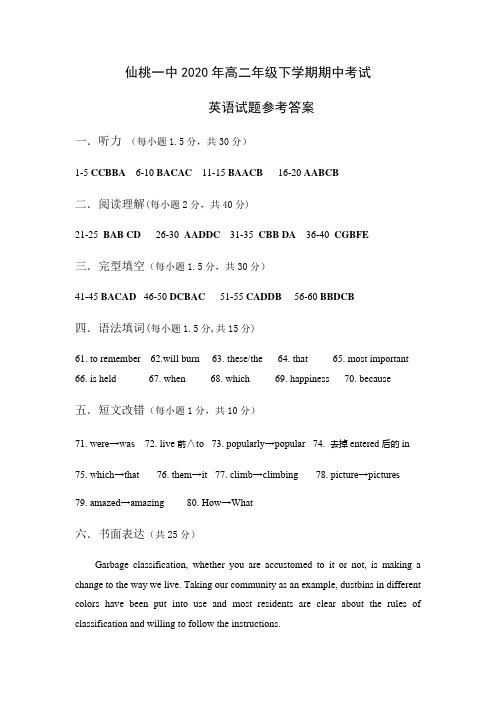
仙桃一中2020年高二年级下学期期中考试英语试题参考答案一.听力(每小题1.5分,共30分)1-5 CCBBA6-10 BACAC11-15 BAACB16-20 AABCB二.阅读理解(每小题2分,共40分)21-25BAB CD 26-30AADDC 31-35CBB DA 36-40CGBFE三.完型填空(每小题1.5分,共30分)41-45 BACAD 46-50 DCBAC 51-55CADDB 56-60 BBDCB四.语法填词(每小题1.5分,共15分)61. to remember 62.will burn 63. these/the 64. that 65. most important 66. is held 67. when 68. which 69. happiness 70. because五.短文改错(每小题1分,共10分)71. were→was 72. live前∧to 73. popularly→popular 74. 去掉entered后的in75. which→that76. them→it77. climb→climbing78. picture→pictures 79. amazed→amazing 80. How→What六.书面表达(共25分)Garbage classification, whether you are accustomed to it or not, is making a change to the way we live. Taking our community as an example, dustbins in different colors have been put into use and most residents are clear about the rules of classification and willing to follow the instructions.Even though it takes a little more time for individuals to sort out their own garbage, it saves the government a considerable amount of time and allows more things to be recycled. In this way, we are shouldering our share of responsibility as citizens. It pays to put garbage into different categories, for our own sake and the sake of nature.。
2019-2020年高二下学期期中英语试卷(附答案)

2019-2020年高二下学期期中英语试卷(附答案)第一部分:听力(共两节,满分20分)第一节(共5小题;每小题1分,满分5分)听下面5段对话。
每段对话后有一个小题,从题中所给的A、B、C三个选项中选出最佳选项。
1. Why does the man think Johnson might be on a diet?A. He looks as if he’s lost weight.B. He is thinner.C. He doesn’t eat too much.2. What do we know about James?A. He is never late.B. He is often late.C. He is not patient.3. What does the woman mean?A. He can certainly depend on his uncle.B. His uncle won’t help him at all.C. He can ask her for help.4. Where might the conversation take place?A. In a supermarket.B. In a garage.C. In a tea house.5. When will the next bus leave for New York?A. Ten o’clock.B. Nine thirty.C. Nine o’clock第二节(共15小题;每小题1分,满分15分)听下面5段对话或独白。
每段对话或独白后有几个小题,从题中所给的A、B、C三个选项中选出最佳选项。
听第6段材料,回答6至8题。
6. What does the woman like doing?A. Going to the folk music.B. Going to the cinema.C. Going to the theatre.7. What will the speakers do tomorrow?A. They are going to watch football games.B. They are going to have a talk again.C. They are going to an exhibition.8. What’s the relationship between the two speakers?A. They are shop assistant and customer.B. They are close friends.C. They are strangers.听第7段材料,回答9至11题。
仙桃一中2019_2020学年高二英语下学期期中试题含解析
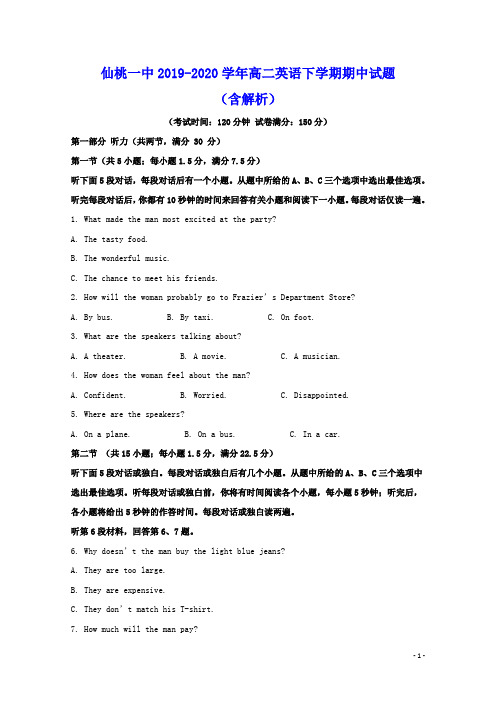
仙桃一中2019-2020学年高二英语下学期期中试题(含解析)(考试时间:120分钟试卷满分:150分)第一部分听力(共两节,满分 30 分)第一节(共5小题;每小题1.5分,满分7.5分)听下面5段对话,每段对话后有一个小题。
从题中所给的A、B、C三个选项中选出最佳选项。
听完每段对话后,你都有10秒钟的时间来回答有关小题和阅读下一小题。
每段对话仅读一遍。
1. What made the man most excited at the party?A. The tasty food.B. The wonderful music.C. The chance to meet his friends.2. How will the woman probably go to Frazier’s Department Store?A. By bus.B. By taxi.C. On foot.3. What are the speakers talking about?A. A theater.B. A movie.C. A musician.4. How does the woman feel about the man?A. Confident.B. Worried.C. Disappointed.5. Where are the speakers?A. On a plane.B. On a bus.C. In a car.第二节(共15小题;每小题1.5分,满分22.5分)听下面5段对话或独白。
每段对话或独白后有几个小题。
从题中所给的A、B、C三个选项中选出最佳选项。
听每段对话或独白前,你将有时间阅读各个小题,每小题5秒钟;听完后,各小题将给出5秒钟的作答时间。
每段对话或独白读两遍。
听第6段材料,回答第6、7题。
6. Why doesn’t the man buy the light blue jeans?A. They are too large.B. They are expensive.C. They don’t match his T-shirt.7. How much will the man pay?A.$39.B. $59.C. $ 69.听第7段材料,回答第8、9题。
- 1、下载文档前请自行甄别文档内容的完整性,平台不提供额外的编辑、内容补充、找答案等附加服务。
- 2、"仅部分预览"的文档,不可在线预览部分如存在完整性等问题,可反馈申请退款(可完整预览的文档不适用该条件!)。
- 3、如文档侵犯您的权益,请联系客服反馈,我们会尽快为您处理(人工客服工作时间:9:00-18:30)。
仙桃一中2020年高二年级下学期期中考试
英语试题参考答案
一.听力(每小题1.5分,共30分)
1-5 CCBBA6-10 BACAC11-15 BAACB16-20 AABCB
二.阅读理解(每小题2分,共40分)
21-25BAB CD 26-30AADDC 31-35CBB DA 36-40CGBFE
三.完型填空(每小题1.5分,共30分)
41-45 BACAD 46-50 DCBAC 51-55CADDB 56-60 BBDCB
四.语法填词(每小题1.5分,共15分)
61. to remember 62.will burn 63. these/the 64. that 65. most important 66. is held 67. when 68. which 69. happiness 70. because
五.短文改错(每小题1分,共10分)
71. were→was 72. live前∧to 73. popularly→popular 74. 去掉entered后的in
75. which→that76. them→it77. climb→climbing78. picture→pictures 79. amazed→amazing 80. How→What
六.书面表达(共25分)
Garbage classification, whether you are accustomed to it or not, is making a change to the way we live. Taking our community as an example, dustbins in different colors have been put into use and most residents are clear about the rules of classification and willing to follow the instructions.
Even though it takes a little more time for individuals to sort out their own garbage, it saves the government a considerable amount of time and allows more things to be recycled. In this way, we are shouldering our share of responsibility as citizens. It pays to put garbage into different categories, for our own sake and the sake of nature.。
